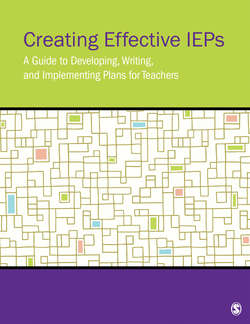Читать книгу Creating Effective IEPs - Nancy Burton - Страница 11
На сайте Литреса книга снята с продажи.
Individualized Plans Required by IDEA 2004 The Individual Family Service Plan and Its Components
ОглавлениеAs previously noted, IDEA 2004 stipulates that individuals with disabilities (birth to 21) are entitled to receive a “free, appropriate public education” (FAPE) in the least restrictive environment (LRE). Additionally, IDEA requires the development of individualized plans for each qualifying individual. Part C of the Individuals with Disabilities Education Act (IDEA) specifically addresses programs for infants and toddlers and stipulates that an Individual Family Service Plan (IFSP) must be developed and implemented. In compliance with Part C of the IDEA, the IFSP is a written document—a plan—that delineates the early intervention services provided to an infant or toddler (birth to 3) and his or her family.
While individual states determine the eligibility requirements and defining characteristics of what constitutes developmental delays, federal regulations very clearly stipulate what must be contained in the IFSP.
Present Levels of Development/Current Levels of FunctioningThis statement includes the child’s present levels of physical, cognitive, communication, social/emotional, and adaptive development.
Family ResourcesA statement identifying the family’s resources, priorities, and concerns regarding the child and his or her development
Measurable OutcomesStatements that stipulate the expected outcomes that will be achieved by both the infant or toddler and the family
Early Intervention ServicesAn explanation of the specific early intervention services that will be provided. A stipulation of length, duration, frequency and intensity, and method of delivering the early intervention services is included.
Natural EnvironmentThe development of the IFSP should be driven by the recognition that not only is the family the child’s greatest resource, but the child’s individual needs are also very closely connected to the needs of his or her family. Consequently, federal guidelines stipulate that early intervention services be delivered in the most natural environment as is appropriate. If not in the child’s natural environment, a statement justifying the action must be included. The appropriate placement is determined by the IFSP Team.
Educational ComponentA statement of the educational component that promotes school readiness for children who are at least 3 years of age
Payment ArrangementsIdentification of payment arrangements and potential funding sources
Service CoordinatorThe name of the service coordinator responsible for the implementation of the IFSP
Transition Out of Early Intervention ServicesA statement indicating the steps to be taken to transition the child out of the early intervention program into another program
